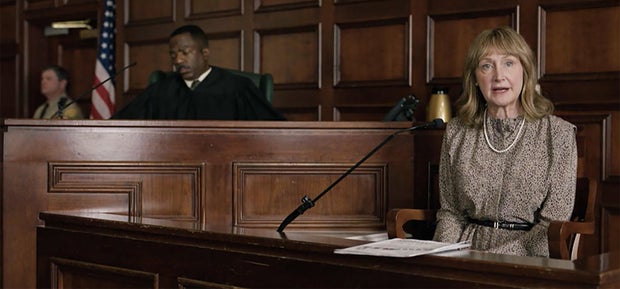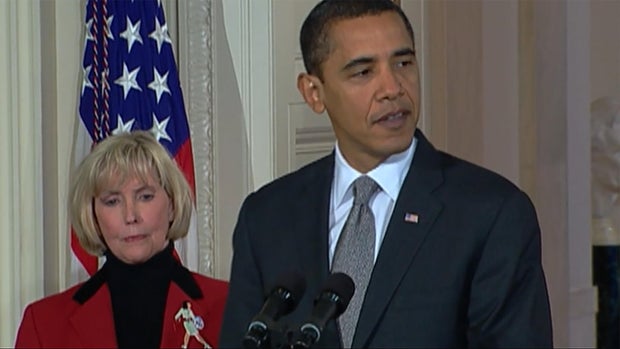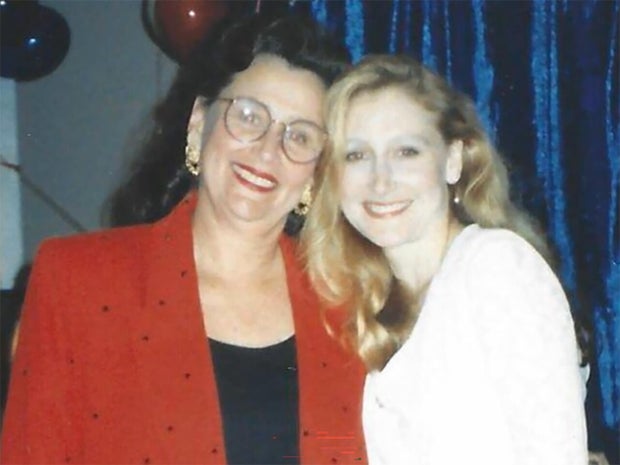If you don’t know the name Lilly Ledbetter, how’s this for an introduction? “Lilly Ledbetter did not set out to be a trailblazer or a household name,” said President Obama in 2009. “She was a good hard worker who did her job, and she did it well for nearly two decades before discovering that for years she was paid less than her male colleagues for doing the very same work.” Forty percent less, by most accounts.
Now, a new film, “Lilly,” starring Patricia Clarkson, chronicles Ledbetter’s David-and-Goliath-type fight for equal pay against her employer, Goodyear Tire and Rubber Company, in Alabama.
Asked what she knew about Ledbetter before reading the script, Clarkson replied, “Well, that she was one of the most remarkable human beings ever put on this Earth, a true, true American hero. A grave injustice had been committed against her. But she was also dealing with misogyny, ageism. But yet, she was this amazing manager. She rose.”
A female manager at a tire factory in the 1970s was almost unheard of. But Ledbetter needed the money to help her husband support their two kids. In 1998, she found a list of names and salaries of her male counterparts, all of whom made far more than she did.
As the movie depicts, Ledbetter found an anonymous note, left for her in her locker, that detailed the pay discrepancies. “And she was devastated,” said her daughter, Vickie Ledbetter Saxon. “She told me she didn’t know how she was going to get through the shift. She was humiliated.”
Ledbetter filed suit, and was awarded $3.8 million in back pay and damages. But a court of appeals overturned the verdict. She never saw a dime.
Blue Harbor Entertainment
Her case made it all the way to the Supreme Court, where a 5-4 ruling in favor of Goodyear stated that she had waited too long to file a discrimination claim (the statute of limitations was just 180 days).
“She was extremely devastated by that,” said Saxon. “And I thought it was over, I really did.”
It wasn’t. By then, Ledbetter was nearly 70, and became a symbol of unequal treatment in the workplace. She made it her life’s mission to correct pay disparity, and she maintained her activism well into her 80s.
In a speech to the Democratic National Convention in 2008, Ledbetter said, “Equal pay for equal work is a fundamental American principle.”
On January 29, 2009, President Obama signed his first piece of legislation: the Lilly Ledbetter Fair Pay Act, which effectively ended the statute of limitations on fair-pay claims.
CBS News
Clarkson said, “People care about her journey. It’s like: I get you. I know who the hell you are. I know what you went through. I’ve been through it, too. And whether you’re a man or a woman or you’re Black or White or young or old, whether you’re a Republican or a Democrat, whether you were gay or straight, everybody struggles in this way.”
Clarkson has played a string of memorable characters, from a heroin addict in “High Art,” to the mom in “Easy A.” She says Hollywood is no exception.
Asked if she believes she was paid equally throughout her career, Clarkson replied, “Oh, no. Oh, no. No. When I was first working, I was paid scale, which is just the barest of minimum. Young men in the movie with me who had the same amount of words or scenes that I had were making a salary. But I was being paid scale. I didn’t know that I was making way less to the dollar. But not anymore, baby!”
Clarkson says to become Lilly, she spent time in a New York City park: “Every time I went somewhere, or I just would walk around the street, I was like, ‘That’s Lilly, that’s Lilly, that’s Lilly.’ I mean, everybody, she’s everywhere.”
Family Photo
She especially found Lilly in her own mother, Jackie Clarkson, a New Orleans City Councilwoman and Louisiana state representative. “What I brought forth was the best of me, my mother, to play Lilly, because I had this shining example,” she said. “It’s very hard for me to watch ‘Lilly.’ My mother is there. My mother is a very kindred spirit with Lilly.”
When she got the part, her mom was her first call. “You know, ’cause I’ve played a lot of complicated women, and she was like, ‘Oh, Patty. Oh, Patty. This is so glorious. This is wonderful. You’re finally gonna be in a movie everybody can see!'”
Clarkson says playing Ledbetter is the privilege of her life.
Asked what she learned about herself by playing Lilly, Clarkson said, “I need to always strive to care more, to be better, to try to be a better human being, to be a better citizen.”
I said, “I think an experience that one has watching this film and seeing her story is to think, ‘Would I rise to the occasion over and over? If I were called upon, would I be that brave?'”
“I don’t know that I would,” said Clarkson. “If I had lost the settlement, I would have been like, ‘I’m done.'”
Both Jackie Clarkson and Ledbetter died last year. Lilly Ledbetter screened the film just days before her death, before Clarkson could meet her.
Asked what she would say to Ledbetter if she could, Clarkson replied, “You lived an exceptional life with very little. And that people can be exceptional with very little. My mother was, too. They’re gonna be dancing. Happy Mother’s Day, Lilly, Mom!”
To watch a trailer for “Lilly” click on the video player below:
For more info:
- “Lilly” is now playing in theaters
Story produced by Robbyn McFadden. Editor: Jason Schmidt.
#Lilly #Patricia #Clarkson #playing #equal #pay #activist #Lilly #Ledbetter










